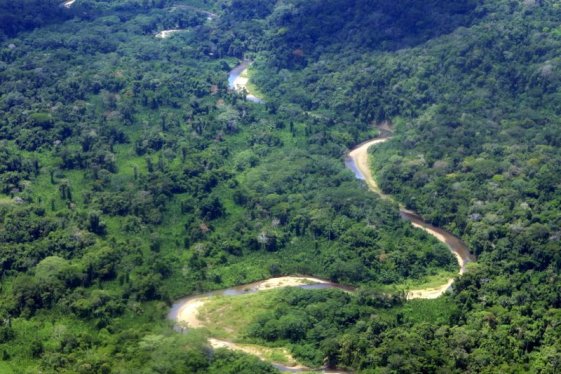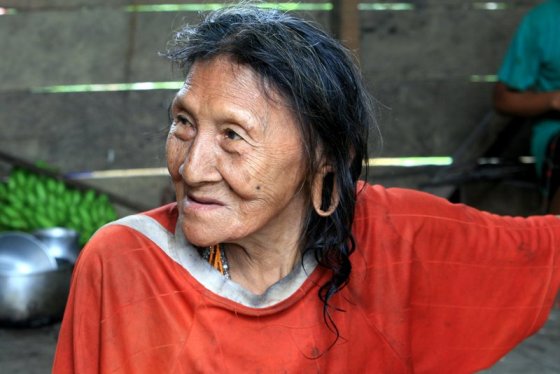When the plane starts to head for the ground, I crane my neck to see what’s ahead. Seated in the co-pilot’s seat of a six-seater bush plane, all I can see is the same thing I’ve been looking at for the entire 45 minute flight, a vast pincushion of endless green forest canopy. We skim the treetops and finally, seconds before hitting the ground, I see the grass landing strip. A couple of bumps, and we have arrived in the tiny village of Quehueri’ono in Ecuador ’s Amazon rainforest.
My husband and I are here to spend five days at Huaorani Ecolodge, a community project organized by the indigenous Huaorani people. The Huaorani, who have lived in this forest for thousands of years, practice a traditional lifestyle where almost everything they need is provided by the land. When missionaries arrived and tried to exert their influence, the Huaorani responded definitively with spears. In recent years, a new threat has emerged with oil and logging companies taking a growing interest in the natural resources present on the Huaorani’s territory. Huaorani Ecolodge is a way of creating awareness for the culture and natural environment of these rainforest people, and also gives the Huaorani an income for basic education and medical services.
On the ground we are met by the local people and yes, some of them are carrying spears. We meet our Huaorani guide, Nenkerey, who supervises loading us and our gear into a dugout canoe that he and a second guide will pole down the shallow Shiripuno River. On sensory overload, we settle into the journey and start to relax to the sound of countless birds and the sight of brightly-coloured butterflies. I cross the blue morpho butterfly off my wish list as we spot its startling wings, each one bigger than my hand.
The lodge is invisible from the river, looking like any other thick swath of jungle except for the motorized dugout canoe out front that is used for emergencies and to transport supplies. We climb into the forest and discover a pathway to five meshed sleeping cabins. We shudder at the creepy crawlie creatures that have already made their way into our cabin and decide we’d better get used to it. After all, this is the jungle.
During our stay here, we do several hikes with Nenkerey who glides silently through the forest, machete in hand. One day he gives us a hunting lesson and attempts to teach us the Huaorani method of tree-climbing. We are astounded at how in tune he is with the natural environment as he points out animal tracks, finds a tiny poison dart frog, and shows us a trampled spot where a jaguar has slept.
The forest walks and natural environment are fascinating, but it is the visits with the local people that will linger in my memory. One of the first people we meet is Moi Enomenga who is the central figure in Joe Kane’s book Savages. As described in the book, Moi has worked tirelessly to help his people preserve their land and culture, especially speaking out against the destructive practises of oil companies. Moi has travelled to the U.S. and London to plead the cause of his people, yet he continues to make this isolated spot his home.
When we arrive at his modest home in a clearing in the rainforest, Moi is carving a blowgun. Cultural barriers and language differences dissolve as Moi’s two-year-old daughter laughs and engages with everyone, visitor and local alike. Soon we are all laughing as we gringos demonstrate our dubious spear-throwing skills and try to light a fire Huaorani-style, without matches. Moi’s wife welcomes us by painting the red dye of a local plant on our faces, a custom we will see repeated on all of our Huaorani visits.
We visit a total of three villages and encounter, quite possibly, the most generous and welcoming people we have ever met. It doesn’t matter that we often need two translators to communicate or that many of the Huaorani perceive Canada simply as “a very cold place that takes more than 60 days to walk to.” We tell them about snow and they tell us about the forest and the pressures impacting their lifestyle. Moi’s mother shakes her head sadly and says she does not like “the Company”, meaning the oil companies. I ask if any of the kids can climb trees and two eight-year-old boys laugh and dart up a couple of tall trees faster than I can grab my camera to photograph them doing it. Some of the women sing for us and ask for a song in return. After some initial panic, we settle on an off-key version of Row Row Row Your Boat. They tell us they will never forget it.
The people at each village lay out a neat row of handicrafts to sell, all made from materials found in the forest. There are string bags, baskets, blowguns and spears, along with jewellery made from colourful seeds suspended on finely woven twine. We select several items for purchase, but it quickly becomes evident that the Huaorani are hunters and warriors rather than merchants, as they either charge us ridiculously low prices or give us whatever we want as gifts.
On our final day in the rainforest, we are in the canoes at 5:00 am. It is surreal to move silently down the river before daybreak as we pass shadowy vegetation and are immersed in the sounds of the jungle, a cacophony of chirps, birdsong and howls. It feels like being in a movie, maybe an escape scene. A piranha jumps right beside the boat, and another time Nenkerey points out a caiman that silently submerges its head as we draw close.
Our final visit is to Nenquipare, which is Nenkerey’s home. Nenkerey’s quiet demeanour changes to animation as he shows us around the village and introduces us to his family. We detect in Nenkerey a deep sense of pride in the Huaorani traditions and skills. He wears the traditional woven headband and consistently begins his explanations of Huaorani life with “We, the Huaorani …”
We finally pull ourselves away from Nenquipare and continue our river journey, soon passing a weather-beaten sign that marks the end of Huaorani territory. We notice a seismic device set up to test for the presence of oil. Two hours later we arrive at a bridge and a road where we board a pickup truck for the rough trip out to the oil-rich town of Coca. We see increased oil activity, noisy processing facilities and huge flares, an unbelievable departure from the pristine environment we’ve enjoyed for the past several days. Startling poverty and unhealthy living conditions provide a chilling reminder of the challenges faced by the Huaorani.
We feel glad that we have supported the Huaorani in a small way through our travels with them, and will not soon forget our kind and generous hosts in the jungle. As we say good-bye, Nenkerey invites us to return. He says, simply “I will always be here, in the forest.” We believe and hope this to be true.
Debbie McKeown is a Canadian travel writer who, before travelling to Ecuador’s Amazon rainforest, considered the only places worth visiting to be cold, high elevation, and devoid of people. Check out her writing at www.djmckeown.com.



This is such an amazing story. How this couple immersed themselves in this culture and the locals welcomed them makes us realize no matter where you are people are all the same. Different customs, different dress, different worries(the oil companies).
A Mother worries about their children just as we do and the children laugh and play just the same. This is the only life they no and I hope the company does not change this for them.
I love that you shared this with us. A place most of us will never see.
A beautiful story I felt as though I was there. Thank you.
great article, but saddens to hear of The Company. Hopefully, more information through articles such as this will help create more awareness.